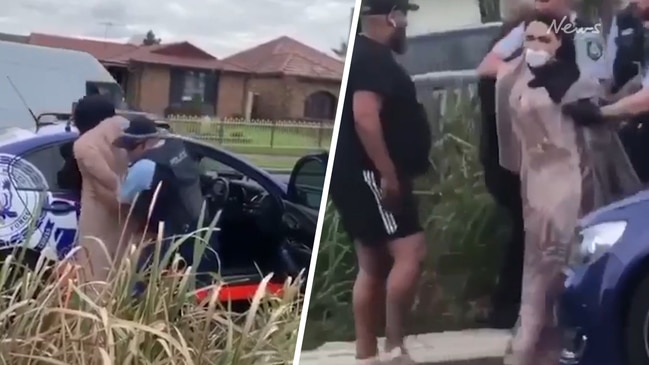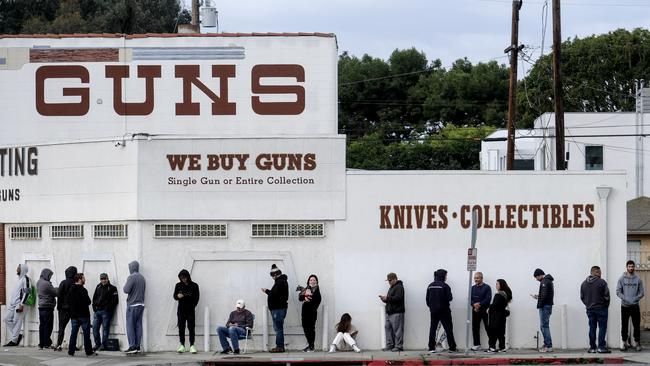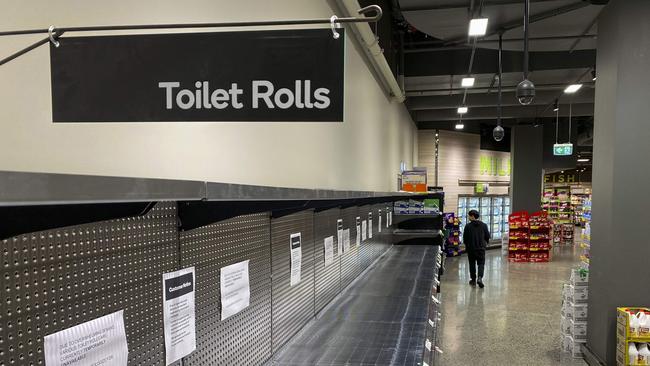Andrew Rule: The ugly side effects of a global pandemic and economic meltdown
It doesn’t take long for the plague rats to appear in a crisis — the ones who start spitting and hitting and stealing as soon as social boundaries break down, writes Andrew Rule.

Andrew Rule
Don't miss out on the headlines from Andrew Rule. Followed categories will be added to My News.
It doesn’t take long for the plague rats to appear.
At the end of the first week of the virus crisis, two women well-known to this reporter were “walking The Tan” around the Botanical Gardens when they were approached by a middle-aged woman dressed strangely for such a warm Friday morning.
She wore an over-size grey hoodie, the hood over her head and long sleeves pulled down way past her hands. By the time the outfit registered as not quite right with the walkers, she was snarling in their faces.
She spat on them then stalked across the street, having “won” a confrontation existing only in her twisted imagination.
One crank doesn’t make a craze. But this was no isolated incident, more an early example of hostile behaviour as our comfortable world comes under a strain not seen in peacetime in a century.
A crisis can bring out the best in many people — and the worst in a troublesome few, the ones who start spitting and hitting and stealing as soon as boundaries break down.
In the Sydney suburb of Greenacre later that same Friday, police pulled over a young woman driving an Audi at up to 120kph in a 50 zone after allegedly running red lights and crossing double lines.
Police say she snarled something about COVID-19 then abused the officer in the sort of language you hear in a prison riot. She, too, had her head and body covered, not with a hoodie but the tight headscarf and long dress usually associated with observant Muslim women.
A million people who have since watched it on YouTube know what happened next. She allegedly spat twice in the officer’s face. The second time, he kept his promise to put her on the ground, which he did with exemplary speed.
It took several cops to hoist her into a paddy wagon. A deluded friend or relative of the woman filmed it all and posted it online in the bizarre belief, maybe, that it showed “police brutality”.

What it showed is exactly what should happen to anyone mad or bad enough to attack police (or paramedics) for doing their job. Maybe the police’s only mistake was not using capsicum spray.
On the video evidence posted by her own supporters, some might think the hooded alleged spitter, Hannah Ayoub, should get jail. So far, what she’s got is bail.
Interestingly, she is not represented by some obscure suburban solicitor but by one of the Bar’s most famous names, Tom Hughes, criminal barrister for 30 years and son of eminent legal identity Tom Hughes QC. Which makes him the brother-in-law of Malcolm Turnbull. Nice to have a blue blood crime specialist on speed dial.
It’s only natural that mass unemployment and a global economic meltdown will throw up some ugly side effects.
The good news in Victoria since the isolation rules came in has meant illicit drug sales are reportedly down for the good reason there’s less disposable income to waste and few gatherings to waste it at.
The truth is, we are in an uneasy lull before we see if Australia is like New Zealand, which has probably headed off the virus just in time — or like the United States, where people are dying in thousands. And where shops and businesses have boarded up windows and doors because of the likelihood of civil unrest, looting and shooting.

Inevitably, gun and ammunition sales are rising in the land of the Second Amendment. It’s no coincidence that ammunition sales have crept up in Australia in recent weeks, too. This is partly because of seasonal demand before the Easter break, when many hunters and campers go bush. But police are uneasy enough about citizens arming themselves by stealth that they have frozen sales of recreational firearms and ammunition.
Like the stripping of supermarket shelves and other supplies, which caused scenes that seemed unthinkable even a few weeks before, these are warning signs of how quickly humans can revert to rat cunning, naked fear and brute force.
Any belief it couldn’t happen here is deluded. When Victoria’s police constables (not including detectives and senior officers) went on strike in 1923, a horde of men and youths poured from Flinders St station to run riot. Three people were killed, trams were destroyed and the few police left on the streets barricaded themselves in the Town Hall to save themselves. Dozens of plate glass windows were smashed and shops looted.
Embarrassed authorities and gullible citizens blamed “a criminal element” but the truth was that most of those arrested had no criminal records, just an opportunist streak. It indicates that many people will do whatever they can get away with, whether it’s failing to isolate after returning from overseas, or breaking the social distance rules, or breaking into empty offices and shops.
It was ordinary people who sensed well before our leaders that vital supplies and household staples would run short in this winter of discontent. It’s outrageous but was totally predictable that alert Chinese agents in Australia could buy and export tonnes of masks and hand sanitiser weeks before our complacent authorities finally realised those goods would be desperately needed here.

Now, someone in Australia’s top echelons must finally be doing what they should have as soon as news of the virus emerged: that is, to “war game” likely scenarios ranging from a false alarm all the way up to Armageddon.
As great novelists and competent psychologists agree, the frightening thing about humans is that if and when the worst happens, we revert to what shrinks call “the reptilian brain” during times of extreme fear.
The survival instinct blots out the bits of the brain that makes us human, the bit that allows abstract thinking, creativity, empathy and control.
What’s left is the primitive stuff we share with crocodiles and snakes: fight, flight, food and fornication. When disaster reduces us to that level, the worst-case scenario is of survivors picking through the rubble.
That’s why a detachment of US Marines have been posted outside the US Embassy in Port Moresby, among other embassies in other places. It is why Australian troops are also preparing to go to Papua New Guinea. Soldiers who say they are being trained in riot control … and on preparing mass graves.
We live in a bubble exactly as fragile as the mutual agreement to obey laws for mutual protection.
What happens if the bubble bursts? That’s something we do not want to find out.
The way to survive is to do the right thing. The rules of isolation are as simple and as vital as obeying traffic lights and driving on the left of the road. It saves lives.
If not your own, then someone you love or someone you know.
READ MORE:
FOUR WEDDINGS AND A FUNERAL IN CORONAVIRUS TIMES

